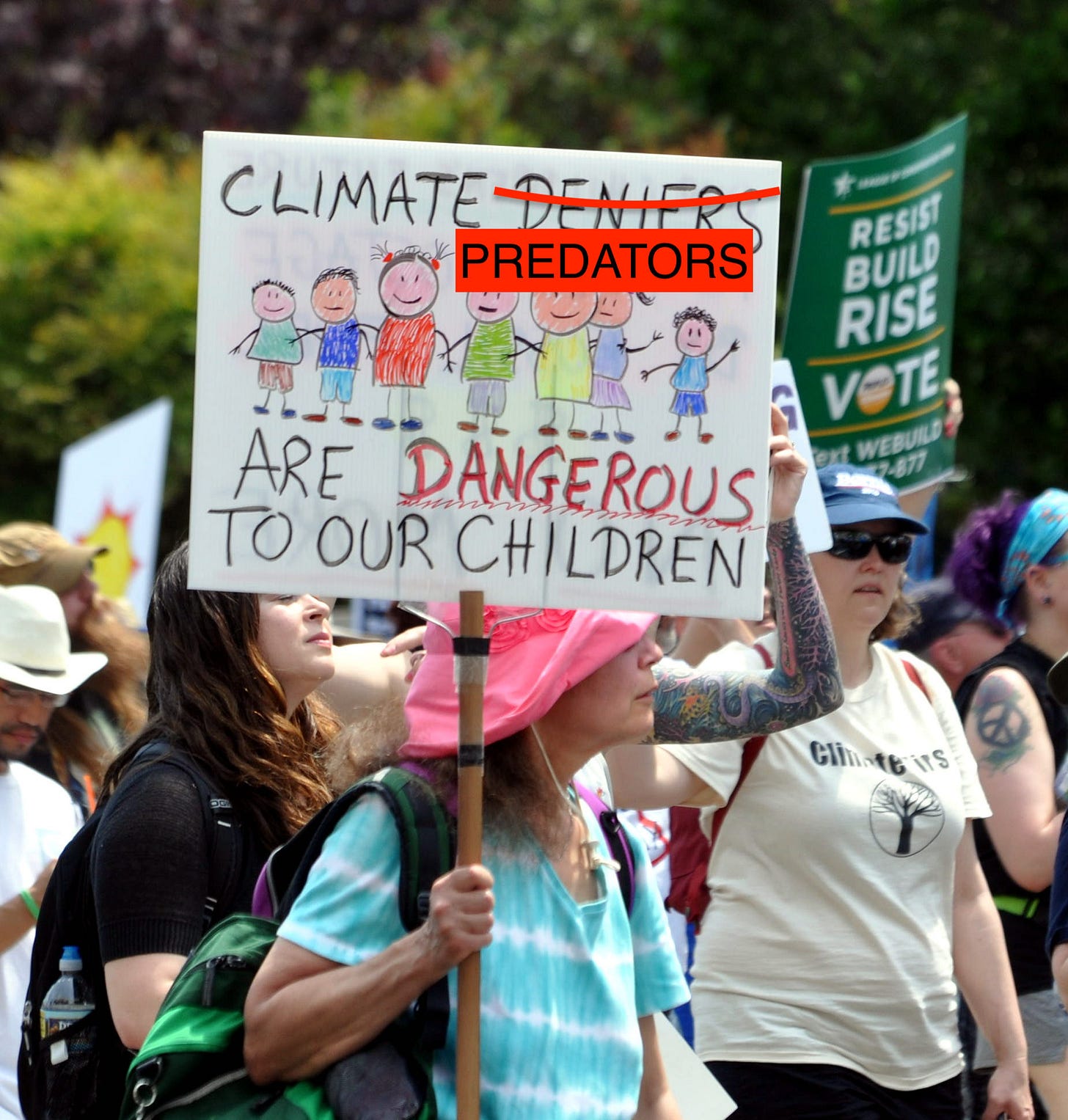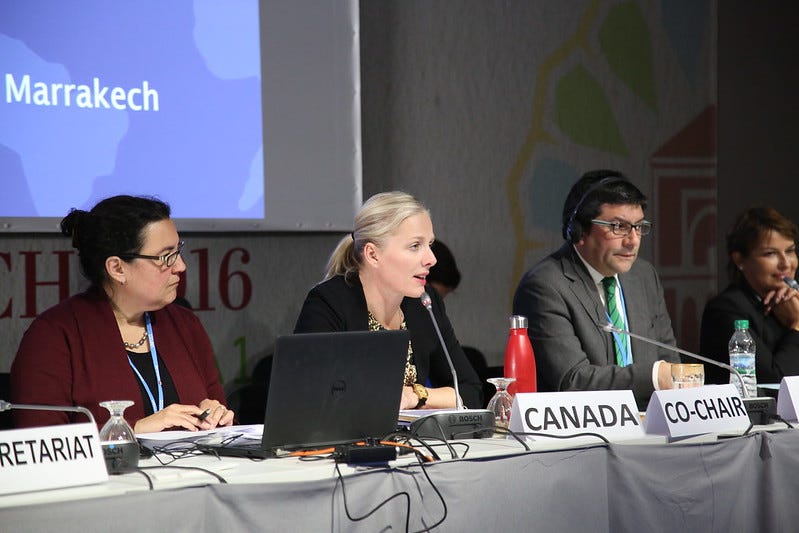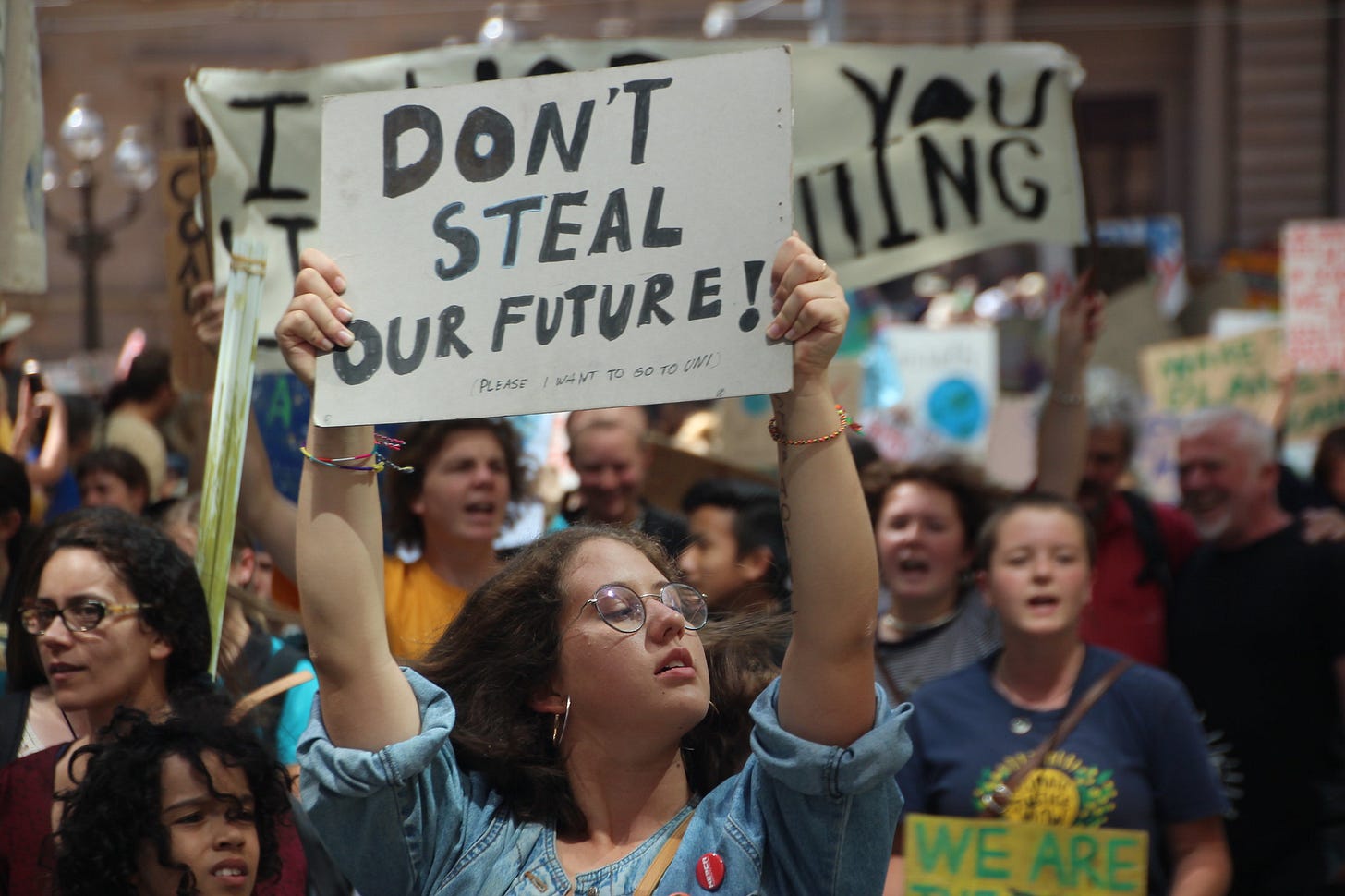Image by Edward Kimmel from Takoma Park, MD, CC BY-SA 2.0 via Wikimedia Commons, edited by the author
Remember that saying from childhood: ‘Sticks and stones may break my bones but names will never hurt me’. Turns out that naming people is not only personally hurtful, but extremely powerful and dangerous.
Those fighting to keep burning dirty fossil fuels know this.
Climate alarmists, climate zealots, climate evangelists.
Climate crazies. Raving inner-city lunatics. Woke capital-city greenies.
Climate cultists and catastrophists.
These are some of the insults they use to denigrate scientists, climate leaders and activists. Not to miss an opportunity to combine support for dirty energy corporations with misogyny, in 2017 Canadian MP Gerry Ritz called Canada's then Environment Minister, Catherine McKenna, a 'climate Barbie'. McKenna tried to get Mattel to take up the idea of a climate action Barbie, recyclable, and made without plastic1.
Canada’s Minister for Environment and Climate Change, Catherine McKenna 2015-2019 (Photo by Ministry of Environment Rawanda: https://www.flickr.com/photos/98168367@N06/)
Names do actually hurt
One of the first things I teach in my grammar classes is the amazing, empiric power of nouns. We learn in primary school that they name ‘person, place and thing’. At face value, this is already an amazing feat - but language doesn’t simply name something that is already there. Language invented the idea of names, and then it created and goes on creating the many categories through which we understand the world.
Our categories are full of cultural assumptions and emotional power. Think of how many words we have in English for a women who has a variety of sexual partners. There’s a quite a long list: slut, ho, hussy, and strumpet. Trollop, harlot, tramp, tart, skank, slag, and slapper. Bike, floozy, hooker, prostitute, vamp, nympho, scrubber. Scarlet woman, fallen woman, Jezebel, goer, seductress. Let me know the ones I’ve forgotten.
These all carry negative connotations. The matching terms for men - Casanova, playboy, lady killer, lady's man, philanderer, womanizer, or rake - are far fewer, and come with meanings of power, masculinity and attractiveness.
All types of lables come with baggage: some positive, some apparently neutral, and some negative. The insults directed at people fighting on the side of climate are very damning. To be called an alarmist or a crazy or a zealot accuses the targets of these insults of being blinding by their beliefs or ideologies. Not only do these labels attack the character of the people they are aimed at, they go on promoting the idea that global warming is a matter of debate and belief.
The ad hominen argument
Humans having been using personal insult as a political strategy for a long time, so long that the Ancient Greeks gave this rhetorical strategy a name. It’s the ‘ad hominen’ argument, Latin for ‘aimed at the man’. In our modern idiom, it’s ‘playing the man person and not the ball’.
A recent paper in Nature’s Scientific Reports journal shows that attacking the people who have done the climate science or who are trying to raise its profile is a very popular strategy with climate disinformation warriors. In this study, the researchers compiled a large corpus of documents from conversative think tanks and anti-climate blogs, a data set of over 174 million words.
By reviewing other research, and reading thousands of randomly selected paragraphs published by these think tanks and blogs, the researchers produced the first comprehensive taxonomy of climate disinformation arguments. They found five general types of anti-climate disinformation being used to keep our planet heating up:
Global warming is not happening
Human Greenhouse Gases are not causing global warming
Climate impacts are not bad
Climate solutions won’t work
Climate movement/science is unreliable
Each of these 5 main arguments come in a variety of rhetorical packages. This snapshot shows the ways the researchers describe the different kinds of ‘ad hominen’ arguments deployed to attack climate science and scientists.
The researchers were surprised by how frequently these anti-climate disinformers used ad hominem arguments. These think tanks and bloggers, they noted, ‘have invested heavily in propagating narratives that intend to damage the credibility of climate science and climate scientists’. School yard name-calling, elevated to a major planet wrecking strategy by the minions of oil, coal and gas merchants.
When I see these attacks on scientists, I feel a kind of anger that I don’t have a name for. With the prospects for the future so abominable - climate scientists are despairing, and CO2 continues its meteoric rise - the character assassinations of hardworking, committed and ethical scientists feels criminal.
What do we call them?
Scientists and academics like to avoid emotional or subjective language. We need our work to be as ‘disinterested’ as possible - by this I mean we need our research to show its findings, regardless of who we are, or what we expected or wanted to find.
This explains the fact that the most popular labels we have to name those trying to stop us and our children having a liveable planet are pretty lame. We refer to the producers of dirty energy sources, very politely, as the ‘fossil fuel industry’. By this name, they get all the feel-goods from the word ‘industry’, associated with plain old hard work.
For those campaigning for the fossil fuel status quo, we have terms like ‘climate skeptics’, or ‘climate deniers’, or ‘climate contrarians’. These are all pretty polite, given what’s at stake. And these names still continue to make global warming a matter of belief or argument. Of these, the big corpus of news data I mentioned in my previous and first post shows ‘climate skeptics’ is waning, and that the dominant term is ‘climate deniers’.
The terms ‘climate deniers’ and ‘climate skeptics’ in the News on the Web corpus
But we need take away all of the grounds on which fossil fuel mongers operate. We have to think carefully about all the key terms in this fight: how we name this crisis, how we name the solutions, and how we name those who will extend the life of dirty fossil fuels at any cost. It’s in the best interests of our children that we do everything we can to make fossil fuel interests feel the weight of our collective condemnation.
Photo from John Englart on Flickr: https://www.flickr.com/photos/takver/ (under CC BY-SA 2.0 license)
Taking control of the narrative
We need pro-climate and pro-planet terms to become the default terms that people use to think about the climate crisis. Word frequency is vital to taking control of the narrative. It’s how we change the way people see global warming, who is causing it, and what has to happen to change the current course towards ever increasing heating.
The most powerful insult I’ve found was coined by the great Australian climate scientist, Tim Flannery. And here is Australia’s Sky News, just over a week ago, denigrating him with the climate alarmist insult.
In a column titled ‘The gloves are off: ‘predatory’ climate deniers are a threat to our children’, Flannery is the first and so far as I can tell the only public person to use the term ‘climate predators’. Flannery writes:
‘The climate crisis has now grown so severe that the actions of the denialists have turned predatory: they are now an immediate threat to our children … How should Australia’s parents deal with those who labour so joyously to create a world in which a large portion of humanity will perish? As I have become ever more furious at the polluters and denialists, I have come to understand they are threatening my children’s well-being as much as anyone who might seek to harm a child’.
When applied to people, the Oxford English Dictionary explains the term ‘predator’ as a ‘person who plunders or pillages’ and ‘a ruthlessly exploitative or rapacious individual’. Now we are getting somewhere.
We need to bring on ‘climate predators’ to reshape the zeitgeist. Start using it. Get your friends and family to use it. Circulate it on your social media.
Climate predators.
Climate predators.
Climate predators.
Say their name.
You can read an interview with the ‘original climate Barbie’ at Heated:











A beautiful passionate piece Annabelle 🙏🏻🫶🏻